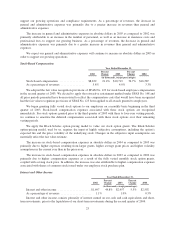NetFlix 2004 Annual Report Download - page 49
Download and view the complete annual report
Please find page 49 of the 2004 NetFlix annual report below. You can navigate through the pages in the report by either clicking on the pages listed below, or by using the keyword search tool below to find specific information within the annual report.In addition, any conditions that adversely affect the movie industry, including constraints on capital,
financial difficulties, regulatory requirements and strikes, work stoppages or other disruptions involving writers,
actors or other essential personnel, could adversely affect the availability of new titles, consumer demand for
filmed entertainment and our business.
If we are unable to renegotiate our revenue sharing agreements when they expire on terms favorable to us,
or if the cost of purchasing titles on a wholesale basis increases, our gross margins may be affected
adversely.
Since 2000, we have entered into numerous revenue sharing arrangements with studios and distributors.
These revenue sharing agreements generally have terms of up to five years. The length of time we share revenue
on each title is a fixed period. As our revenue sharing agreements expire, we may be required to negotiate new
terms that could be disadvantageous to us.
During the course of our revenue sharing relationship with studios and distributors, various contract
administration issues arise. To the extent that we are unable to resolve any of these issues in an amicable manner,
our relationship with the studios and distributors may be adversely impacted.
Titles that we do not acquire under a revenue sharing agreement are purchased on a wholesale basis from
studios or other distributors. If the price of purchased titles increases, our gross margin will be affected adversely.
If the sales price of DVDs to retail consumers decreases, our ability to attract new subscribers may be
affected adversely.
The cost of manufacturing DVDs is substantially less than the price for which new DVDs are generally sold
in the retail market. Thus, we believe that studios and other resellers of DVDs have significant flexibility in
pricing DVDs for retail sale. If the retail price of DVDs decreases significantly, consumers may choose to
purchase DVDs instead of subscribing to our service.
If VOD or other technologies are widely adopted and supported as a method of content delivery by the
studios and consumers, our business could be adversely affected.
Some digital cable providers and a limited number of Internet content providers have implemented
technology referred to as VOD. This technology transmits movies and other entertainment content on demand
with interactive capabilities such as start, stop and rewind. In addition to being available from a small number of
cable providers, VOD has been introduced over the Internet, as high-speed Internet access has greatly increased
the speed and quality of viewing content, including feature-length movies, on personal computers. In addition,
other technologies have been developed that allow alternative means for consumers to receive and watch movies
or other entertainment. If VOD or other technologies become affordable and viable alternative methods of
content delivery widely supported by studios and adopted by consumers, our business could be adversely
affected.
We may need additional capital, and we cannot be sure that additional financing will be available.
Historically, we have funded our operations and capital expenditures through proceeds from private equity
and debt financings, equipment leases and cash flow from operations. Although we currently anticipate that the
proceeds from our May 2002 initial public offering, together with our available funds and cash flow from
operations, will be sufficient to meet our cash needs for the foreseeable future, we may require additional
financing. Our ability to obtain financing will depend, among other things, on our development efforts, business
plans, operating performance and condition of the capital markets at the time we seek financing. We cannot
assure you that additional financing will be available to us on favorable terms when required, or at all. If we raise
additional funds through the issuance of equity, equity-linked or debt securities, those securities may have rights,
preferences or privileges senior to the rights of our common stock, and our stockholders may experience dilution.
33
























